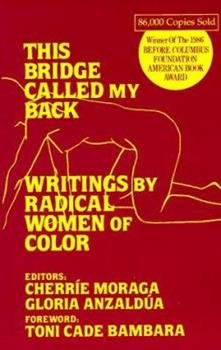Cherrié Moraga
This Bridge Called My Back: Writings by Radical Women of Color (1981), Co-Edited with Gloria Anzaldúa
“This Bridge Called My Back intends to reflect an uncompromised definition of feminism by women of color in the U.S.”
“A theory in the flesh means one where the physical realities of our lives — our skin color, the land or concrete we grew up on, our sexual longings — all fuse to create a politic born of necessity.”
“We are challenging white feminists to be accountable for their racism because at the base we still want to believe that they really want freedom for all of us.”
“I think of how, even as a feminist lesbian, I have so wanted to ignore my own homophobia, my own hatred of myself for being queer. I have not wanted to admit that my deepest personal sense of myself has not quite ‘caught up’ with my ‘woman-identified’ politics. I have been afraid to criticize lesbian writers who choose to ‘skip over’ these issues in the name of feminism. In 1979, we talk of ‘old gay’ and ‘butch and femme’ roles as if they were ancient history. We toss them aside as merely patriarchal notions. And yet, the truth of the matter is that I have sometimes taken society's fear and hatred of lesbians to bed with me. I have sometimes hated my lover for loving me. I have sometimes felt ‘not woman enough’ for her. I have sometimes felt ‘not man enough.’ For a lesbian trying to survive in a heterosexist society, there is no easy way around these emotions. Similarly, in a white-dominated world, there is little getting around racism and our own internalization of it. It's always there, embodied in someone we least expect to rub up against.”
Feature 3
Aenean eu justo sed elit dignissim aliquam. Vivamus a ante congue, porta nunc nec, hendrerit turpis.
